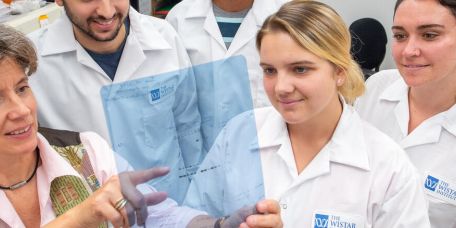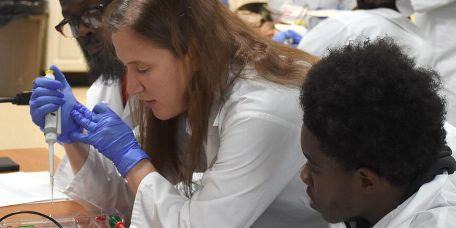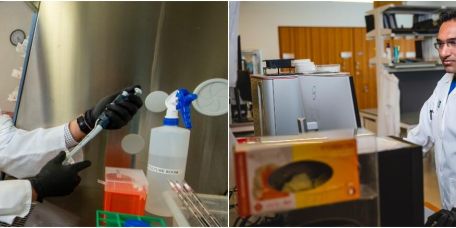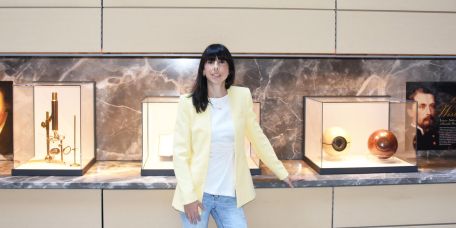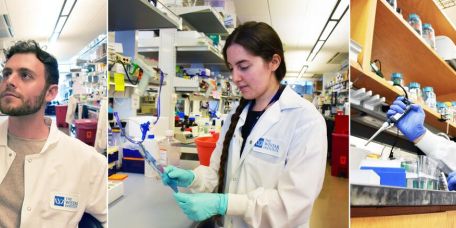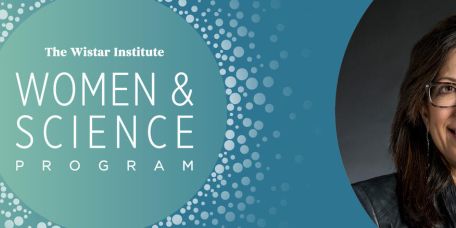The Wistar Institute
Dr. Maureen Murphy: Scientist and Teacher
Wistar offers the perfect blend of qualities for cancer researchers to thrive. Challenging science paired with a social cause is the winning formula that propels Dr. Maureen Murphy in her quest to cure cancer. A researcher for over 25 years, Murphy…
STEM Night at R.W. Brown Boys and Girls Club: Exploring Our Roots with DNA
Dr. Jason Diaz, The Wistar Institute education program director, moved around R.W. Brown Community Center classroom full of aquariums with turtles and fish, assorted plants, and books. Dr. Diaz’s excitement was obvious as he peppered the high school…
Wistar Scientists Identify Link Between Mitochondria and Pancreatic Cancer Risk
PHILADELPHIA — (OCTOBER 12, 2022) — The mitochondria is a key energy-producing component of the human cell that plays an important role in cancer cell metabolism. In a research paper published in PLOS ONE, Dario C. Altieri, M.D., president and chief…
Up in (Antibody) Arms: Synthetic DNA Immunotherapy Platform Combats Brain Cancer
Researchers in the Weiner Lab developed DNA-launched bispecific T cell engagers that controlled tumor growth and improved survival in glioblastoma. Glioblastoma is one of the most severe and aggressive forms of brain cancer with limited treatment op…
Wistar’s Dr. Amelia Escolano Earns NIH Director’s New Innovator Award
PHILADELPHIA — (OCTOBER 4, 2022) — The National Institutes of Health has awarded Amelia Escolano, Ph.D., assistant professor in The Wistar Institute’s Vaccine & Immunotherapy Center, the 2022 NIH Director’s New Innovator Award. The honor provide…
Fighting Breast Cancer Disparities Through Collaboration
A decade-long collaboration between Wistar and ChristianaCare is leading to new discoveries and better treatment for triple-negative breast cancer patients. Dario C. Altieri, M.D., president, CEO, and director of the Ellen and Ronald Caplan Cancer C…
Supporting Science Across Borders with Student Exchange
Nestled in Northern Italy, the city of Bologna is one filled with medieval architecture, sprawling city squares, and a culture of scientific excellence. The University of Bologna is considered the oldest university in the western world and asserts a…
Finding Balance at the Bench
This National Postdoc Appreciation Week, we asked our postdoctoral fellows how they strive to keep balance between their research and personal lives. Wistar postdoctoral fellows serve as critical members of a principal investigator’s lab. They have…
Setting a Prime Example: Wistar’s Women & Science Program featuring Dr. Elizabeth Jaffee
As attendees tuned into their screens, Dr. Elizabeth Jaffee began her presentation Pancreatic Cancer Is PRIMED to Become an Immunologic Disease. With a full house of Zoomers, the Deputy Director of The Sidney Kimmel Comprehensive Cancer Center at Jo…
Wistar Scientists Identify Key Biomarkers that Reliably Predict Response to Immune Checkpoint Inhibitor Therapy for Melanoma
New research finds biological processes that improve prediction of therapeutic performance and provide a framework to develop predictors for this aggressive skin cancer. PHILADELPHIA — (SEPTEMBER 19, 2022) — Immune checkpoint inhibitor (ICI) therapy…
